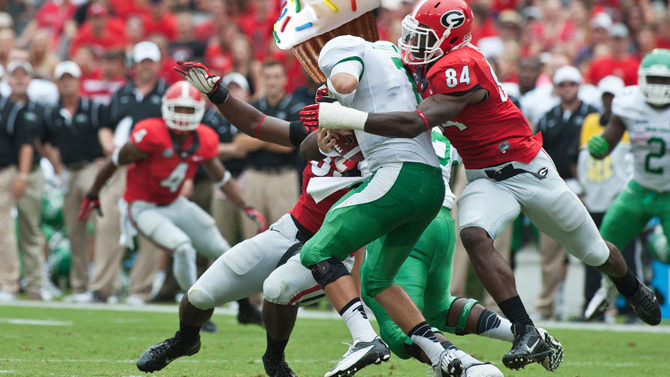Behind the scenes of the Georgia Bulldogs’ game day weekends is a delicate balancing act of scheduling.
A vital part of UGA’s plan, besides winning, is to arrange as many home games as it can, which can be a costly endeavor. The team’s schedule not only contributes to fans’ happiness and the university’s bottom line, but to the health of the Athens economy.
The University of Georgia Athletic Association agreed to pay North Texas University $975,000 for that school’s trip to Sanford Stadium a few weeks ago, and Appalachian State will receive $325,000 for making the trek from Boone, NC, Saturday, Nov. 9.
Many fans deride these games—played against lesser-tier Football Championship Subdivision (FCS) teams or schools from minor conferences in the stronger Football Bowl Subdivision (FBS)—as “cupcakes,” also known as an “easy win,” and criticize the exorbitant expense.
“As a season ticket holder, that seems odd,” Bryce Cannon says. “You could make money instead of spend money.”
Fans spend a lot of time and money obtaining tickets. A UGA alumnus spends a significant amount of money for a “membership fee,” which consists of an 80-percent tax-deductible “donation” of roughly around $1,000. Donations earn priority points, which accumulate over time and increase the chances of getting seats.
“To get away-game tickets, it took almost six years worth of points,” Cannon says.
Those selected to receive season tickets are still on the hook for $250 per seat, plus the $40 face value for every game.
Even with the extensive transaction, Cannon says that he attends every home game, cupcake or not.
Scheduling Strategy
Josh Brooks, associate athletic director for internal operations, says he understands and appreciates the feedback of fans who want the Bulldogs to play a higher tier team every game. But, he asks, “What’s the risk/reward factor of playing those games? You’d sure help strengthen the schedule, but a loss is a loss.”
In the Southeastern Conference, each team has to play eight matchups against conference opponents. Traditional rival Georgia Tech makes it nine games that are automatically on the schedule every year.
Brooks adds that it wouldn’t make sense for the Bulldogs to be the only team to “step out and play 12 BCS opponents” when other teams usually play eight or nine. And this year, the Bulldogs are actually playing 10 teams that are eligible for the Bowl Championship Series, the system that selects the national champion.
After Brooks presents the various options for scheduling, the final decisions are left up to Athletic Director Greg McGarity and Coach Mark Richt.
“My goal in choosing games for us to play is I want to win a national championship,” Brooks says. “So, everything starts with that, and we work backwards from there.”
Beyond the financial benefits for the traveling team’s athletic budget, it also provides opportunities in the form of “exposure and learning experiences,” says Jennifer Samp, a member of the UGA Council and the UGA Athletic Association board.
When teams like Appalachian State play nationally ranked teams, such as the Bulldogs, the spotlight gives them a great advantage for being discovered, according to Samp. “It’s not always as easy a game as people think,” she says. “If the team with the higher level of national exposure doesn’t take it seriously, sometimes there are some pretty shocking losses.”
The Appalachian State Mountaineers know it firsthand. When they beat Michigan in Ann Arbor in 2007, they became the first FCS team to defeat a ranked FBS opponent.
Brooks, who was the former director of football operations for the University of Lousiana-Monroe when it upset Alabama in 2007, knows it, too. “I would never use the term ‘cupcake,’ because I’ve been on that side of the aisle,” Brooks says.
Downtown Activity
When teams play at Sanford Stadium it’s mutually beneficial for downtown Athens and the university. Both make more money playing at home than away, regardless of the team, which is one of the reasons why they want “as many home games as possible” and fork out the cash for teams to come play, Brooks says. (UGA is playing six, rather than the usual seven, home games this year.)
Home games are a financial windfall for restaurants and other businesses downtown. However, not all home games are made equal. The major SEC match-ups do a better job of filling up the hotels than teams like Appalachian State, says Hannah Smith, director of marketing and communications for the Athens Convention and Visitors Bureau.
David Carter, owner of Gyro Wrap directly across Broad Street from campus, says he makes about twice as much money when Georgia plays a team that’s equally or higher ranked. The time of day also plays a pivotal role in fans’ spending patterns.
The general rule of thumb, Carter explains, is the earlier the game, the less money businesses make. Carter uses last season as an example to show the difference the game time can make. When the Bulldogs played the University of Buffalo in 2012, the game was set for 12:20 p.m., and when they played Florida Atlantic University, kickoff was at 7:30 p.m. He says his restaurant made 15 percent less from Buffalo.
“Generally speaking, when we’re playing someone like Appalachian State or North Texas, they’ll schedule earlier in the day,” Carter says.
While Brooks picks which teams to play, he has little control over what time they’ll play. “For the most part, it’s dictated by television,” he says.
When the Bulldogs play weaker opponents, Carter knows that it will usually be a blowout by halftime, and people will leave the area rather than go out to eat. Mid-afternoon games are the best for downtown restaurants—fans will come in for lunch, watch the game, and then eat dinner when it’s over. Carter says Gyro Wrap had a record day of sales a few weeks ago when senior quarterback Aaron Murray secured his first win against then-No. 6 South Carolina, a 3:30 p.m. game.
“I was here when we had a losing season back in the early ’90s,” Carter recalls, “and there was one game where I had my crew all ready to go, and nothing happened. I walked out onto the sidewalk and looked in both directions, and there was nobody.”
That’s another reason why all the scheduling decisions Brooks makes are with a national championship in mind.
“If you win the national championship, everything else will take care of itself,” says Brooks. “Doesn’t matter if you have the toughest, best schedule in the world, if you’re 6-6, it’s not going to help fill Sanford Stadium or help the local economy.”
Like what you just read? Support Flagpole by making a donation today. Every dollar you give helps fund our ongoing mission to provide Athens with quality, independent journalism.










